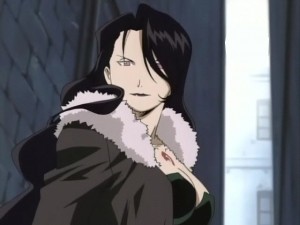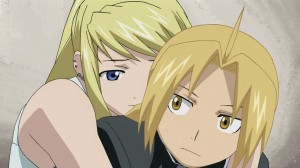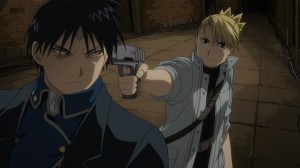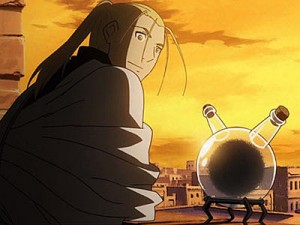[Hey, anime-niacs! Enjoy this guest post by Crystal Kaba! – Ed.]
In the universe of Fullmetal Alchemist: Brotherhood (Brotherhood), trained alchemists harness their ability to destroy and recreate life in order save, kill and unleash all sorts of terrifying creations. Homunculi, evil human dolls, are born when an alchemist attempts to bring a human back to life. Each homunculus, named after one the seven deadly sins, represents a sin, and each acts according to it.
Except for Lust. Sure, she looks the part: a tiny waist, a breathy voice, breasts that defy gravity. But she typically utters only words of disdain or disinterest. She acts as Gluttony’s keeper, constantly giving him permission to consume living humans. Perhaps Lust has gone the way of so many women, controlling her appetite instead of pursuing illicit affairs.

But why isn’t Lust lustful? Doesn’t it go beyond clichés about female characters and sexuality?
At first glance, it appears the lack of lust in Lust symbolized the particularly evil or benign nature of the sin. But, after closer inspection, that isn’t the case. At least, not quite. Lust acts without lust, because in Brotherhood, lust does not exist. Love does not exist. Not romantic love, as we typically know it and see it in anime. In Brotherhood, there is only friendship and the jump to the deep, committed love of long-term partners. None of the slow build-up, the simple flirting typical of anime.
Protagonist Edward Elric falls for Winry, the pretty blonde girl who lives next door. They develop their feelings slowly, while in separate rooms accomplishing more important tasks. When Ed finally declares his love, the two do not kiss or embrace. Instead, Ed steps onto a train, off on a solitary adventure. He could be gone for months or years but Winry doesn’t mind. She knows he’ll be back. They’ll stay together, get married, have children.

A similar relationship occurs between flame alchemist Roy Mustang and his personal assistant slash bodyguard, Riza Hawkeye. Mustang trained under Hawkeye’s father and fought alongside her during the war. He gave Hawkeye orders to shoot him if he ever steps off the path of righteousness. Though their relationship lacks any physical passion, the pair heads towards commitment. Hawkeye always stands by Mustang’s side, staring at him with eternal devotion.
Unlike other characters, Mustang is quick-tempered and vengeful. His passionate side makes its first appearance when he kills Lust. In a confrontation between Lust and Hawkeye, Lust incorrectly says that she’s killed Mustang. Hawkeye drops to her knees in tears, frozen in misery. Lust is about to kill her when Mustang appears. He shoots flames at Lust, burning her over and over until she finally expires.
No other character serves as an appropriate foil for Lust. She dies by Mustang’s hand because he’s the only character full of passion, anger and his own lust for power. Late in the series, Mustang almost takes his vengeance too far. Homunculus Envy reveals that he killed Mustang’s good friend, Maes Hughes. A furious Mustang attacks Envy until the homunculus teeters on the brink of death. Just as Mustang is about to kill Envy, Hawkeye points a gun at his head. If Mustang kills Envy, if he allows hatred to consume him, she’ll shoot. Mustang steps away and releases his anger.
Passion leads Mustang down the wrong path. It forces Hawkeye, his platonic life partner, to step in and threaten to end his life. If Mustang succumbs to the temptation of vengeance, his life is over. Even if Hawkeye lets him live, he’ll become a hateful, petty ruler — far from his dream of ruling the country with logic and justice.

The country, Amestris, suffers from its passion. Amestris pursued hatred to the point of genocide. As we learn in flash backs, the soldiers helped slaughter Ishbalans. Like many cases of genocide, an evil ruler orchestrated the pointless slaughter. In this case, the ruler was the original homunculus, the Dwarf in the Flask Homunculus. He organized the bloodshed to create a giant transmutation circle. He uses the circle, and the souls of every living human on the planet, in an attempt to consume and become God.
The Dwarf manipulates hundreds of leaders, thousands of soldiers. He invokes the hatred necessary for genocide without struggle because the Amestrian people lack reason. They allow their stored anger to explode in support of a meaningless war with no purpose but the destruction of an entire race.

The characters in Brotherhood lack lust, and love, because within the universe, unchecked passion always leads to destruction. The protagonists recognize this and place limits on their desire. Ed refuses to use a philosophers stone to swap his metal arm and leg for the flesh he lost; Mustang would rather die than rule with vengeance.
But lust cannot be controlled. It is a thought not actions, and there is no way to extricate it from the mind. Either Mustang wants a physical relationship with Hawkeye or he doesn’t. There is no halfway, no in between. And love, romantic love, goes far beyond lust. It swoops a character off his feet, making morality or external desires seem insignificant. The characters of Brotherhood lack love because it is incompatible with their goals. Love is unchecked passion in its purest form. The characters skip straight to long term, platonic love. The love of an old married couple. An accepting, rational love. A love that could never lead to ill-fated actions like rape, murder or genocide.
Crystal Kaba is an agnostic, feminist vegan living in Los Angeles. She is currently pursuing a career as a screenwriter.

[Will love tear us apart? Can real romantic love exist without lust, even in Amestris? Sound off in the comments! – Ed.]
Great article! As an anime fan and after watching all of the first Full Metal and most of Brotherhood, I never even thought about the obvious. The Lust character, only visually, embodies the idea.
Fullmetal has so many things to explore. I need to finish Brotherhood after reading this. It’s nice to see another post on anime from a fan.
Nice observations.
I always thought Lust represented bloodlust, or that’s what i’d heard. She seems to enjoy the act of killing more than the other Homunculi do.
Are the distinct abilities of homunculi also intended to be reflective of sins that they are supposed to embody? Envy and Gluttony are pretty easy to detect based on their unique powers. Maybe finding the connection between sexual desire and having sharp, extending fingers can help decode Lust’s lackluster personality.
“Homunculi, evil human dolls, are born when an alchemist attempts to bring a human back to life. Each homunculus, named after one the seven deadly sins, represents a sin, and each acts according to it.”
I don’t know if this is a deliberate attempt to avoid spoilers, but I feel it’s important to point out that in Brotherhood continuity, which seems to be what you’re discussing here, the homonculi are offshoots of the original homonculus, Father (the dwarf in the flask) and are explicitly said to be his sins, which he has expelled.
In the first anime series, the origin of the homonculi is as you explained, and they were given names by an external person (Dante), after their creation. In Brotherhood, they explicitly ARE those sins. Which makes Lust’s lack of lustfulness even more baffling – in the old anime, I got the impression that Dante (the woman who named them) was just arbitrarily giving them names to fit the theme. (Sloth and lust in that continuity really fail to uphold their names.)
So, in Brotherhood continuity, I thought that Lust was perhaps a hypothetical object of Father’s lust. Either that, or he had no lust to begin with but still thought he’s create a homonculus based on that ecause eh, why not? :/
I think the meta explanation is that the author introduced Lust (and Envy and Gluttony) before she really thought out their origins, and later tried to shoehorn in their relationship with Father. But leaving that aside, we don’t really know anything about Father before he’s stuck in the flask, so I suppose positing that Lust is the object of Father’s lust is as good as anything.
In fact, tying the homonculi to Father’s time in the flask may make more sense. Pride’s appearance is closest to what Father looked like in the flask, a black shadow with eyes. Lust is the embodiment of the physical pleasure he is denied, as is Gluttony. Envy is the jealousy he feels of the humans around him. Greed is his desire to escape and rule the world. Sloth is his patience in carrying out his plan.
I’ve left off Wrath because he was a human who was implanted with a philosopher’s stone, rather than being extracted from Father’s body.
Lust and Wrath to me seem the least fleshed out concepts in the Anime. I didnt get it til you said Lust was never lustful. And you never seen Wrath get angry and go berserk.
Gluttony eats, Sloth is slow (and fast lol), Pride believes he is powerful (he is!), Envy (my fav) really does want to be human in the end, and Greed, well we know he wants everything
The 1st series had a much better representation of Lust if not only because they gave her screen time.
Like the passion that the protagonists of FMA experiences, which is slow-building and confidently maintained, Wrath spends a lot of his time directing his passionate feelings. It all comes out when he’s in the middle of a fight, and things get dramatic, and he can direct his passions into his swordplay.
I think your differentiation between “romantic love” and “platonic love” is unfair. Romantic love isn’t “unchecked passion in its purest form.” What is more romantic than a man and woman who care more about each other than about themselves? Two people who are willing to do whatever it takes to help each other achieve their dreams? True, the relationships between Edward and Winry, Mustang and Hawkeye, Maes and his wife, Edward’s sensei and her husband…in fact all the love relationships in the manga…have an air of permanence and stability. But they aren’t stagnant or passion-less. The relationships are rich and full of true, self-sacrificial love.
I do take your point about Lust. She isn’t particularly lustful, which has bothered me in every incarnation of Hiromu Arakawa’s story. Perhaps, as one of the older homunculi, she’s discovered the truth–that lust, or passion of any kind, is ultimately unfulfilling. It’s the richer, more stayed love demonstrated in any of the loving couples in the story that’s worth pursing. Being the embodiment of unbridled lust just isn’t rewarding, so she becomes the sarcastic, disinterested character we see even at the beginning of the story.
Your argument is flawed because you oversimplify the meaning of lust.
Lust is an intense desire for something that doesn’t properly have material existence. It is most commonly understood as sexual desire for another, but can in fact refer to massive desire for anything abstract. Lust for power is a very common motivation for villains. Conquest, honour, respect, and knowledge are also things that can be lusted after.
Lust embodies bloodlust. She revels in bloodshed and causing others to suffer.
I think you focused too much on Lust’s appearance and not enough on her behavior. Some of the homunucli are obvious embodiments of their deadly sins, but Pride is different because he drains the powers of people around him. This act of diminishing others’ talents in relation to his own shows us that the homunculi can have symbolic powers to live up to their names. Thus, Lust is not named as such because of her wardrobe but because she can convince good and evil characters to do her bidding in the hope of impressing her.
In addition, using Mustang and Elric as examples of FMA’s hatred of passion is flawed for these reasons:
1. Elric skips having sex with Winry because this is a TV show that children might see, and how many anime can you think of that have explicit sex?
2. Mustang and Hawkeye are described as master/bodyguard, but you could also say they’re adopted siblings. Thus, a romantic relationship would be incestuous and as a result Elric and Winry are on a different plane than Mustang and Hawkeye
Finally, the idea that unchecked passions will destroy us is the central idea behind the 7 Deadly Sins–they are bad habits that must be replaced with the 7 Great Virtues. Hawkeye threatens Mustang to prevent him from going down the path of Wrath, as he must be Patient instead and let Envy get what’s coming to him, in this life or the next. Deadly sins like lust cannot be controlled because they are the point at which the emotions have gone out of control, and staying on the path of virtue keeps you in check.
On your point of avoiding sex in anime series, there’s an entire internet full of anime which feature explicit sex that could possibly draw the attention of children with giant robots, awesome sword fights, and colorful, nonthreatening demon-looking fellows ready to rape and maim. Besides that, FMA doesn’t need to feature explicit sex in order to tell its audience that sexual desire exists between its characters. Various scenes of romantic interest without the payoff of intercourse in Neon Genesis Evangelion can serve as good examples of that.
I think your forgetting that lust isn’t just sexual. If greed is the desire for lots of things, or a lot of one thing, like money, or power, lust is the desire for one specific power. Lust isn’t the representation of Fathers lust for others, he doesn’t have that. It’s his bloodlust. His desire to kill others. I think her design and personality represent the duality of lust. It’s traditional meaning, sexual lust, but the personality under her appearance, the deeper part of lust, and the more important and impactful part of lust, bloodlust. That’s why lust is shown so much in the beginning. As we learn more about her we learn more about the show, and we see the deeper problems.
Or maybe I’m just desperate to defend my favorite show. Both are possibilities.
Lust doesn’t represent the Father’s lust for others, on the contrary lust is only mildly promiscuous, but serves mostly as an object of lust for others, feeding their desires so that she could fulfill her duties to Father. in other words she represents the Father’s ability to seduce others to do his bidding
I think bloodlust and sexual lust is derailed, because Lust has an another lust she always tells explicitly : she wants to be a human being. Soo Lust has lust of being a human being.Maybe Father wants all of the pleasure what a free human being with integrity of Body and mind and soul can reaches. It is not enough but a part of his lust.; )